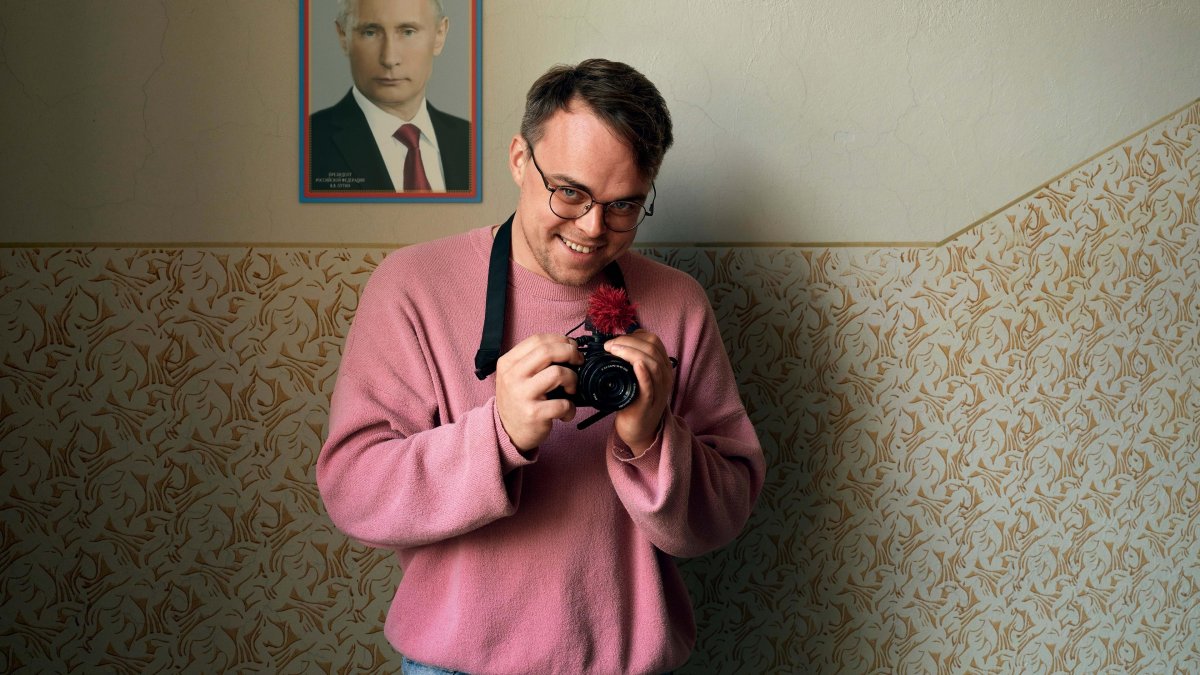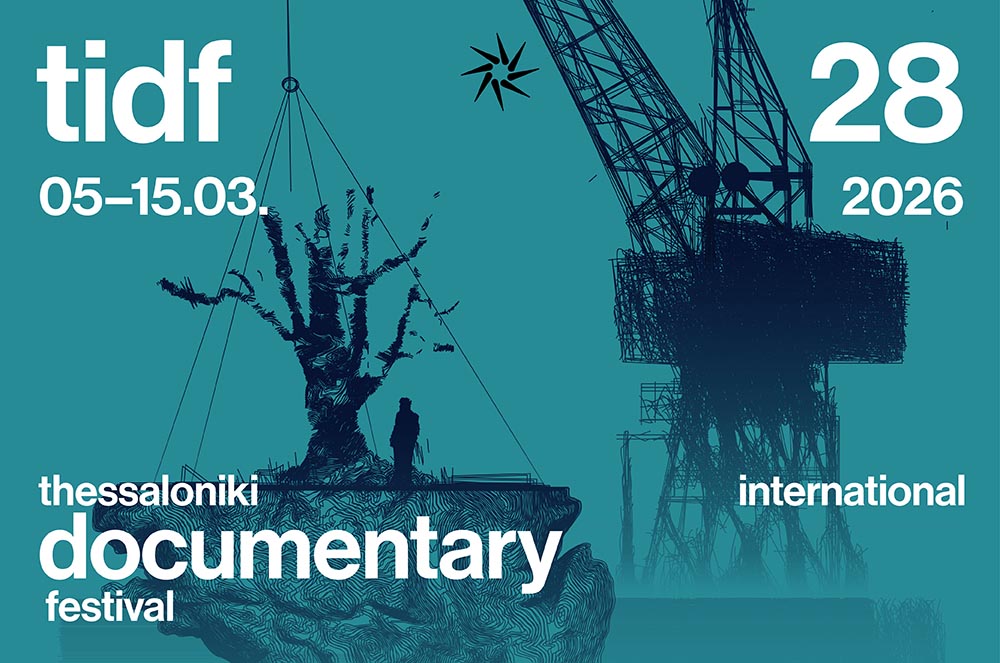The 66th Thessaloniki International Film Festival (30/10-9/11/2025) turns the spotlight on one of the greatest narrative devices of all times, widely used in cinema as well, that has enriched countless renowned artistic works, while placing several masterpieces of the seventh art on a pedestal.
This year’s Festival hosts a tribute on the technique of plot twist, adopting a subversive approach on this valuable narrative tool. The tribute titled Plot Twist, Beyond the Sixth Sense goes beyond the most popular and manifest plot twists found in cinema, casting a glance on rare and lesser known films, shot over the last fifty years, from 1976 to 2025. Two gems of Greek cinema stand out among the tribute’s films, Kinetta by Yorgos Lanthimos and The Photograph by Nikos Papatakis. The formation of the tribute’s programme was carried out by art curator and The Renaissance Society at The University of Chicago director Myriam Ben Salah, who will undertake the curation of France's pavilion in the upcoming Venice Biennale, scheduled to be held in October 2026.
The subject of plot twist as an overturn and reversal emanates from the organic dialogue between the Festival and the main theme of the 9th Thessaloniki Biennale of Contemporary Art “Everything must change. Radical Intelligence. Saloniki 9”, curated by art historian and independent curator Nadja Argyropoulou. The illustration of this dialogue in the form of visual art is displayed in the exhibition “Plot Twist (the science fiction change)”, which serves as a prelude to the Biennale 9 exhibitions and is carried out under the umbrella of Nadja Argyropoulou and the Festival’s Artistic Director Orestis Andreadakis.
“The tribute’s structure and the selection of films take us right to the core of the “reversal of expectations” (as one could lay down and translate the meaning of plot twist in Greek), transcend the boundaries of a simple surprise and incite us to realize that appearances can very often be deceiving,” points out Orestis Andeadakis. The common thread that runs through the selection of films reveals that behind the notion of plot twist one finds ruptures rather than clever reversals or narrative mechanics — what happens when cinema interrupts our habits of seeing. The tribute’s films remind us that stories are never innocent. On the contrary, they have been built on omissions, silences, the power to narrate or to render invisible. They don’t merely entertain with reversals; they implicate us in the illusions we’ve been content to accept.
In Myriam Ben Salah’s own words: “A plot twist is often mistaken for spectacle: the sudden reversal, the neat trick that makes an audience gasp. But what if the real twist isn’t about surprise at all? What if it’s about recognition: that unsettling instant when what has been there all along finally comes into view. As Isabella Hammad writes, the power of recognition lies not in revelation, but in the belated alignment of perception and truth. It is tragic not because it shocks, but because it arrives too late.”
Walking down the plot twist branches and bifurcations in areas that exceed even the art of cinema, she goes on to add: “In some parts of the world, the twist is not a narrative device but a condition of life: repetition mistaken for change, catastrophe staged as revelation, truth visible only once it can no longer alter the outcome. These films move in that terrain. They remind us that stories are never neutral, that every fiction carries consequences, and that recognition, when it finally comes, is not resolution but an ethical demand.”
The exhibition “Plot Twist (the science fiction change)” will celebrate its official opening on Friday October 31st, and will be showcased at the MOMus-Experimental Center for the Arts up until November 16th, 2025. The exhibition is the opening act of Biennale 9 that will be in full force in May-July, 2026.
The exhibition’s starting-off point is the installation of the triptych Urthworks (Slow Action [2010], Urth [2016], Look Then Below [2019]) by the top-notch British artist Ben Rivers. In addition, River;s new film Mare’s Nest, based on the one-act- play The Word for Snow by Don DeLilo and awarded at the Locarno Film Festival, will be screened at the 66th TIFF, in collaboration with the Athens Avant-Garde Film Festival. Ben Rivers will attend both the exhibition's opening and the screening of Mare’s Nest. The exhibition is also unfolding through the new work of the Errands Group titled U.F.O. lost in HEAVEN (2025) - The Journey of a Forgotten Future and a series of historic works by pioneering Greek filmmaker Kostas Sfikas.
Nadja Argyropoulou stresses: “The notion of the plot twist, the way it looms in sci-fi culture like a hunch, a feeling of openness and a possibility, and is presented in this exhibition that serves as a prelude for the Biennale 9, can be perceived as a rebellious insightfulness and a catalyst of change. It is not a fugue, but a necessity, an act of coordination with a world of multiple worlds, a palpable imagination, a radical futurism, as it rebuilds time (the intertwining of already and not yet) following the thread of structural comprehension of illiberality and the combatively joyous reversal of its dead ends.”
As always, the tribute of this year’s Festival is matched by a special thematic edition, which includes texts and analyses written by cinema erudites, sociologists and journalists. In particular, the edition will feature pieces by Myriam Ben Salah, Nadja Argyropoulou, screenwriter and author Nikos Panagiotopoulos, the Festival’s Artistic Director Orestis Andreadakis, and the Festival’s Editions Coordinator Geli Mademli, complementing a series of landmark texts that revolve around the concept of plot twist.
In the highly ingenious and Sundance-winner Atropia (2025) by Hailey Gates, a movie set is transformed into a simulated war-stricken land, destined to enhance the training of the American soldiers, before being sent out to the hellhole of Iraq. The romance developed between Fayruz, the star of the “cast” and a veteran playing the role of an insurgent, puts at risk both the ambitions of the former and the entire endeavor: a comic love story, wearing the suit of a political satire, that springs right out the heart of an American-made absurdism.
In the thrilling Bouchra (2025), the fanciful debut film by Orian Barki and Meriem Bennani (the latter gave us the addictive series of works 2 Lizards amidst the pandemic), the mix of 3D animation and documentary-like style, crafts an irresistible hybrid narrative, where cinema mirrors the intricate relation between to anthropomorphous coyotes: a queer filmmaker that lives and works in New York and her cardiologist mother who lives in Casablanca. Α Fondazione Prada production that just celebrated its world premiere at the Toronto International Film Festival.
In Genealogy of Violence (2024) by Mohamed Bourouissa, a short film bursting with energy, a boy and a girl of Arab origin are subjected to an unjustified and exhaustive ID verification control by two policemen. Through the use of elaborate techniques both in terms of camerawork and visual effects, the film unearths the unseen, age-old and recurring paths of violence and discrimination. A film about the spirit’s escape from a totalitarian surrounding delivered by a multifaceted and awarded visual artist.
In the adventurous They Are the Dogs (2013) by Hisham Lasri, a TV crew closely follows a recently released prisoner. Through a modern-day Odyssey amidst the abuzz Casablanca and the tumultuous Moroccan society, the film illustrates the eternal conflict between experienced memory and the misleading media recording, crossing the distance that separates rebellion and repression.
In the tender yet painful The Time That Remains (2009) by Elia Suleiman, the recollections of director’s father recorded in the form of a diary are inextricably interweaved with the collective and time-old drama of the Palestinian people. The notions of filmic and historical time are folded and intertwined, measuring an unhealed trauma and transforming what remains into memory, hope and a solid reminder, in a subtle homage to the cinema of Jacques Tati.
In the mystic and enchanting short film Kempinski (2007) by Neïl Beloufa, human figures emerge through the deepest dark of the night to narrate stories that come from a future like a reminiscence and travel towards a past that is yet to be revealed. An otherworldly blend of sci-fi, pseudo-documentary and the primordial traditions of Mali, that decomposes all narrative certainties.
The delightful documentary VHS - Cahloucha (2006) by Nejib Belkadhi introduces us to a Tunisian home-brewed film director and actor, who incessantly shoots amateur b-movie type films, featuring a cast from the poorest social and educational layers, lauded by the audience. Through the reverse reflection of the lavished aesthetics, we are immersed in a fascinating journey in the core of cinema’s magic.
In Kinetta (2005), the impressive directorial debut of Yorgos Lanthimos, the entire world seems to have immersed itself in an off-season and out-of-work status. A policeman, a photographer and a cleaning lady, in a deserted and inactive summer resort, videotape and reenact several crimes committed in the wider region, in a quirky and weird study on the everlasting unreliability of images and the cloudy nature of reality.
In the mesmeric Goodbye, Dragon Inn (2003) by the masterful virtuoso Tsai Ming-liang, film narrative, the moving images and the dark theater’s rituality are transformed into a land of ghosts, eternal return, unfulfilled desire and time rupture, reminding us that cinema travels beyond what meets the eye and captures the mind. An indispensable 21st century film, for cinema’s unique genius loci and the power of collective viewing, which is threatened today more than ever before.
The Spousals of God (1998), the final installment in João César Monteiro’s trilogy where the director portrays the main character of João de Deus, walks down the familiar paths of relentless sarcasm against religious and social hypocrisy. Having been given a deus-ex-machina gift of a suitcase full of cash by a “messenger of God”, the film’s clochard hero is transformed into a tycoon in the blink of an eye, but remains chained to his morbid fantasies and desires.
In the unforgettable Close-Up (1990) by Abbas Kiarostami, the film that secured him a spot on the world cinema stage, a one-of-a-kind incident of identity fraud involving the Iranian filmmaker Mohsen Makhmalbaf serves as the bedrock for a mesmerizing swirling into the world-changing traits of the cinematic truth that often abolishes any unwritten law of the dull reality: a hybrid film that unfolds in prisons, courtrooms, bustling streets, packed buses, and living rooms, unveiling the spectral yet robust nature of life and of the human condition.
The Photograph (1986) by Nico Papatakis, through the device of a simple photo that serves as an illusionary reflection of a constructed reality, touches upon the open wounds of contemporary Greek society: from the drama of the immigration uprooting all the way to the gloomy political landscape and the frail identity of a country in transition. At the same time, it weaves a multilayered allegory on the truthfulness and deception of images, in a grandiose parable on cinema itself.
Shot in Colombia’s Cali in the guise of documentary, The Vampires of Poverty (1978) by Carlos Mayolo and Luis Ospina denounces the photogenic embellishment of poverty by Western culture. Armed with a vitriolic black humour, the film castigates the artistic opportunism that exploits human pain, as well as the counterfeit sensitivity as a springboard for profit and recognition.
The daring short film And the Dogs Were Quiet (1976), directed by poet, activist, feminist and vocal advocate of Pan-Africanism, anti-colonialism and “third cinema” Sarah Maldoror (1929-2020),, is based on the titular theater play by Aimé Césaire, one of the most prominent figures of Creole literature. Transforming the Musée de l’Homme in Paris into a deeply allegorical scenery, a dramatic dialogue dissects the trauma and the vulgarity of colonialism, as well as of the mechanisms that ensured its historical silencing and justification.
Creative partners:















